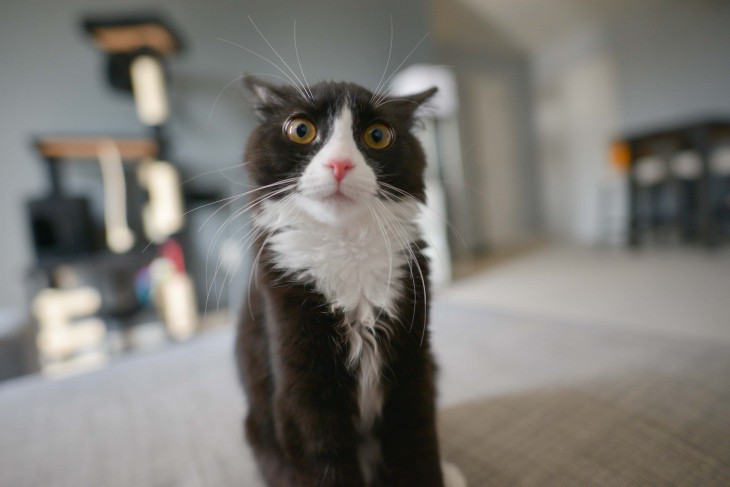Your cat is sleeping peacefully. Suddenly! It wakes up startled with eyes wide open; its pupils are dilated. Your cat is on high alert for no apparent reason. It starts scratching itself or licking and biting its flank like there’s no tomorrow. It then runs around the house like it is being chased by an invisible dog. Then, just as suddenly your cat acts like nothing is wrong and it goes back to sleep.
“What’s wrong with my cat?” you ask yourself. Your cat may be suffering from what is commonly called “twitchy cat syndrome” also known as “rippling skin syndrome,” or “rolling skin syndrome” or “hyperesthesia syndrome”. The more technical names for this condition are “neuritis” or “atypical neurodermatitis”.
If you are puzzled by your cat’s behavior, you are not alone. Veterinary neuroscientists are just as confounded, and they have yet to discover what actually causes twitchy cat syndrome. So how do you know if your cat is suffering from hyperesthesia syndrome?
The best thing to do is to observe if the episode occurs again. Write down your observations and record the date and time of each episode. Next, take your cat to the vet along with your observations. Describe the behavior to your vet. Since the symptoms of neuritis are very similar to other diseases or conditions, your vet will check your cat for those first before determining if your cat has twitchy cat syndrome.
Some conditions your vet will examine your cat for are:
Flea Allergy Dermatitis – if your cat has a severe allergic reaction to fleas, one single flea can cause long-term itching and skin irritation. If diagnosed with Flea Allergy Dermatitis, follow the treatment prescribed by your vet. You may also want to consider using flea treatments and prevention remedies formulated specifically for cats.
Dry, itchy skin – this is usually common in cats fed a dry food diet. Based on your vet’s recommendation you might want to change your cat’s food to include moist cat food.
A Seizure Disorder – in simple terms a seizure is unexpected and aberrant electrical activity in your cat’s brain. Common causes of seizures are injuries to the head, infections, or genetics. Your vet might prescribe seizure medication if your cat is diagnosed with having a seizure disorder.
Obsessive Compulsive Disorder (OCD) – yes! Cats like humans suffer from OCD. In cats, OCD may be prevalent if your cat is eating non-food items or engaging in wool-sucking (pica) or seems to be highly anxious. Your vet may recommend giving your cat calming supplements or medications.
If your cat is not diagnosed with any of the above conditions, your vet might conclude that it is suffering from twitchy cat syndrome. But don’t worry, there is a remedy. Since anxiety is associated with hyperesthesia syndrome, some behavior training might help.
Be Consistent – Consistency with a capital “C” is crucial to reducing your cat’s anxiety. It is important to make sure your cat’s litter box, water and food is placed in the same locations throughout your house.
Set a Play Time – Cats like routine. Make some time during the day to interact with it in a playful manner. Try to schedule the play time in short sessions. Three or four sessions a day should be ideal.
A Place of Its Own – Cats like their own space. An area where a cat can climb, scratch or just relax will help reduce its anxiety.
Unfortunately, in some cases, medications are needed to reduce your cat’s anxiety. Your vet may prescribe the following medications to work in concert with the behavior changing remedies mentioned above: Fluoxetine may help in stabilizing your cat’s mood. Phenobarbital – can help with seizures. Prednisolone – is an anti-inflammatory used to treat skin conditions and skin allergies. Gabapentin–is a combination of anti-seizure medication with analgesic.
While you and your cat may have to learn to live with hyperesthesia syndrome, it doesn’t mean your lives have to be drastically altered. With some little changes in behavior and the help of some medications you and your cat can keep each other company for years to come.





